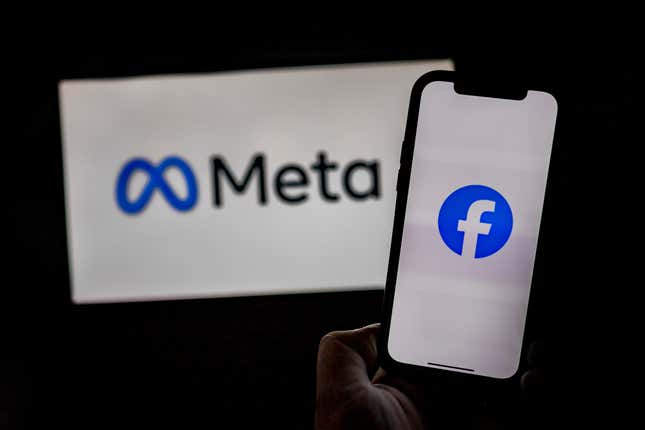Facebook stole my book to train its AI. The insult wasn’t the money
May 7, 2025
It started with an email from my literary agent.
“You might’ve heard about LibGen and books being used to train AI,” she wrote. “A search of the database shows that Poe for Your Problems is on the list.”
I had seen the headline, back in March, in The Atlantic: “Meta (META) pirated millions of books to train its AI,” it screamed. But to my shame, I hadn’t actually read the piece. I had been too busy writing for Quartz (as now) and chasing my four-year-old around the house. Life goes on, even when someone steals your intellectual property.
Yet there it was. The story detailed how Meta employees had downloaded tens of gigabytes of pirated books from LibGen, a well-known “shadow library” that hosts roughly eight million titles. They used these files to help train LLaMA 3, the company’s most advanced language model.
Internal discussions, unsealed earlier this year as part of an ongoing lawsuit, show that Meta’s engineers explicitly debated the legal risks and chose to proceed anyway, looking to save both time and money. The documents further suggest that top leadership signed off on the maneuver. “Eventually, the team at Meta got permission from ‘MZ’ — an apparent reference to Meta CEO Mark Zuckerberg — to download and use the data set,” The Atlantic reported.
In response, a group of authors including Sarah Silverman have filed a class action lawsuit, now winding its way through the legal system.
Still, when my agent’s email came, my first reaction wasn’t outrage
Instead, I was relieved. My little book had been deemed important enough to steal! Thank goodness. The greater shame would’ve been not being pirated, considering the scale of the theft. I turned to a friend who happened to be standing nearby and said, “It’s just nice to be included.”
If that seems like a perverse reaction, well, it conveys how humbling it can be to achieve your lifelong author dreams. Many people dream of publishing a book someday — I had since I was eight years old — but becoming an author is a lesson in humility, at least in my experience. You show up at a bookstore to give a reading to five people, two of whom are your dad’s cousins. You do podcast interviews in which the host greets you with, “So I haven’t had time to read your book… can you remind me what it’s about and who you are?” Like I said: humbling.
But the relief quickly curdled as I remembered what it had been like to sell the book in the first place. Nonfiction is sold on proposal — which means you don’t write the book, you write a 40-page business plan for the book. I spent years on mine, rewriting it three separate times. I got upwards of two dozen rejections before it finally went to auction and found a home with a Hachette subsidiary in 2019.
After that, it took another year to write the actual book. When it came out in 2021, I spent thousands of hours promoting it.
Technically speaking, I was paid
My advance was $20,000 — not nothing. But that was before taxes and my agent’s 15% cut. I once calculated that I’d earned less than the federal minimum wage for writing the book. Since it “earned out” in 2023 (meaning the publisher fully made back its costs), I’ve received another $10,000 in royalties. Those checks are always welcome, but they’re also pre-tax couch change compared to the time, energy, and ambition that went into the work.
It’s hard to explain just how difficult it is to land a publishing deal, especially with one of the “Big Four.” Unless you’re an Obama or a Kardashian, it’s nearly impossible. Publishing is a perpetually precarious industry, surviving year to year on breakout hits like Atomic Habits or It Ends With Us. Even the largest publishers operate on net margins of about 6%. That doesn’t leave much room for risk. So they’re understandably reluctant to bet on an unproven author with an odd idea.
I got around the issue of not being famous myself by writing about someone who was: my literary hero, Edgar Allan Poe. But that didn’t make things easy. Selling a self-help book based on the life of history’s most miserable writer was, perhaps unsurprisingly, an uphill battle.
And while my genre — irreverent self-help, sometimes called “anti-self-help” — is relatively common now, it wasn’t when I was knocking on doors, metaphorical hat in hand. Putting together a convincing business case was hard enough. Writing the actual book — 55,000 words of deeply researched, counterintuitive argument — was harder still.
“To coin one’s brain into silver, at the nod of a master, is to my thinking, the hardest task in the world,” Poe once wrote.
It’s no less true when you’re the master, too.

Meta could have bought my book. It chose to steal it
Today, Amazon sells my book for $12.99. My cut of that is $2.25. And that’s too steep a price tag for Meta? A company worth $1.5 trillion, helmed by a founder with a $200 billion net worth? Mark Zuckerberg owns about 13% of Meta stock. He could’ve paid me $2.25 — the amount I earn per sale — almost 89 billion times. Or he could’ve just bought a single copy, which would’ve cost him 0.0000011% of his wealth.
Assuming a $20 sticker price on each of the 7.5 million pirated books, actually paying for all of them would’ve cost about $150 million — not even one-tenth of one percent of Zuckerberg’s fortune.
Me? I would’ve come out $2.25 better. I could’ve bought a Snickers, depending on the gas station. Surely the world’s third-richest man could swing that.
If you want to understand the artist’s dilemma in the AI age, it’s this: Do something singular, something that takes years of obsessive creative labor — then watch it get stolen by someone for whom $150 million is a rounding error.
In that light, it’s not just theft. It’s bullying. Exploitation. Looting on a grand scale. The stuff of Upton Sinclair. Only we don’t have robber barons anymore. We have pirate captains. Bluebeards of the human heart. And what are we supposed to fight them with? Carefully worded emails? That’s like bringing a spork to a nuclear war.
Some authors think publishers should be the ones leading the charge.
“I checked one of the sites,” the novelist Domenica Ruta told me, “and yes, both my former books were used to train AI. I’m furious and feel utterly powerless about what to do. My take is that publishers — who absolutely have the resources — need to be the frontline defenders against this. They need to protect their authors and our work. As individuals we have little power. A Big Four publisher has a lot more influence.”
Meta has defended its actions as ‘fair use.’ But nothing could be less fair
When Facebook came to power and popularity circa 2010, we at least understood the bargain: In exchange for our data, we got to post above-average-cute photos of ourselves, and learn our relatives’ reprehensible political views. The calculation has shifted since, with Meta stealing something much more intimate, deeply personal, and hard-won than data.
If I’d plagiarized someone’s book, I’d be in trouble. I’d go to court, face consequences, quite likely be publicly shamed. That’s not what’s happening to Zuckerberg. Instead, he hangs out at the White House.
If you walked into Barnes & Noble and stole a $13 book, you’d get the police called on you. But steal 7.5 million, and you’ll make billions. It’s an object lesson in contemporary law enforcement: the bigger the crime, the more likely you are to get away with it. By the same token, shoplift some disposable razors and you’re a menace, a criminal. Steal 7.5 million books and you’re a visionary. That’s the math now. People love to obsess about thefts of toothpaste and Tide Pods at CVS (CVS) in San Francisco, but plunder on an epic scale just slightly further south and you’ll not only walk away untouched, you’ll emerge vastly richer.
It’s hard to think this wasn’t Meta’s whole calculus to begin with. Gamble big, make billions, and let the lawsuits drag on. A lawyer friend of mine put it plainly: The copyright cases are about to enter discovery in both New York and California, and Meta is likely to lose. But by then, the damage will be done. As they said, “No one loves to read more than lawyers and judges.”
In the meantime, the industry is already eyeing a workaround by lobbying the executive branch directly.
Here’s the part I really hate to say: I don’t think they can be stopped either, whatever the class action lawsuit does. Facebook has faced down governments. It’s currently facing down the FTC and the European Union. And beyond Facebook, vast as it is, there’s the whole AI wave we’re all riding, if unequally. Companies like Meta, Amazon (AMZN) and Microsoft (MSFT) are likely to reap long-term trillions by creating AI tools and programs. I’ve covered the stock market for more than a decade and I’ve never seen economic logic so relentless. Meanwhile, artists and white-collar workers are losing their livelihoods on top of the knowledge and ingenuity that’s already been stolen from them.
To coin one’s brain into silver — and watch it be scraped by AI — is enough to make you question the point of doing it in the first place.
Lest I seem knee-jerk anti-capitalist, I should add that I come at all this as an author and a shareholder. Checking my Etrade (MS) just now, I see I own about $31,000 in Meta stock. That’s in a regular, non-retirement brokerage account and doesn’t include shares I own indirectly through index and mutual funds. I started buying the stock circa the IPO because I’ve long recognized the wealth-creation dynamics of our era: Hard work may or may not pay off, but invest in companies like Meta and you can ride along for the extra-legal wealth they’re likely to create. It’s the surer thing.
So I don’t begrudge Meta its $16.4 billion quarterly profit, not necessarily. But as a shareholder, I don’t want it earned through theft.
And as a writer, I feel the same way.
You want so badly to enter the cultural DNA. But if it means you get erased, robbed, exploited?
Not so much.
Search
RECENT PRESS RELEASES
Related Post



